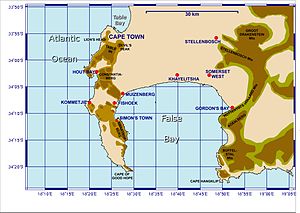Invasion of the Cape Colony (1795)
| Invasion of the Cape Colony | |||||||
|---|---|---|---|---|---|---|---|
| Part of the French Revolutionary Wars | |||||||
 Cape Peninsula region |
|||||||
|
|||||||
| Belligerents | |||||||
|
|
|
||||||
| Commanders and leaders | |||||||
|
|
|
||||||
| Strength | |||||||
| 3,600 | 1,800 | ||||||
The Invasion of the Cape Colony was a British military expedition launched in 1795 against the Dutch Cape Colony at the Cape of Good Hope, the southern tip of Southern Africa. The Dutch colony at the Cape, established in the seventeenth century, was at the time the only viable South African port for ships making the journey from Europe to the European colonies in the East Indies. It therefore held vital strategic importance, although it was otherwise economically insignificant. In the winter of 1794, during the French Revolutionary Wars, French troops entered the Dutch Republic, which was reformed into the Batavian Republic. In response, Great Britain launched operations against the Dutch Empire to use of its facilities against the French Navy.
The British expedition was led by Vice-Admiral Sir George Keith Elphinstone and sailed in April 1795, arriving off Simon's Town at the Cape in June. Attempts were made to negotiate a settlement with the colony, but talks achieved nothing and an amphibious landing was made on 7 August. A short battle was fought at Muizenberg, and skirmishing between British and Dutch forces continued until September when a larger military force landed. With Cape Town under threat, Dutch Governor Abraham Josias Sluysken surrendered the colony. Elphinstone subsequently strengthened the garrison against counterattack and stationed a Royal Navy squadron off the port. Almost a year later a Dutch reinforcement convoy reached the colony only to find that it was badly outnumbered, and surrendered without a fight. The British occupation continued until the Peace of Amiens in 1802 when it was returned to the Dutch. In 1806 during the Napoleonic Wars a second British invasion reoccupied the colony after the Battle of Blaauwberg and it remained a British colony until the establishment of the Union of South Africa in 1910.
...
Wikipedia
